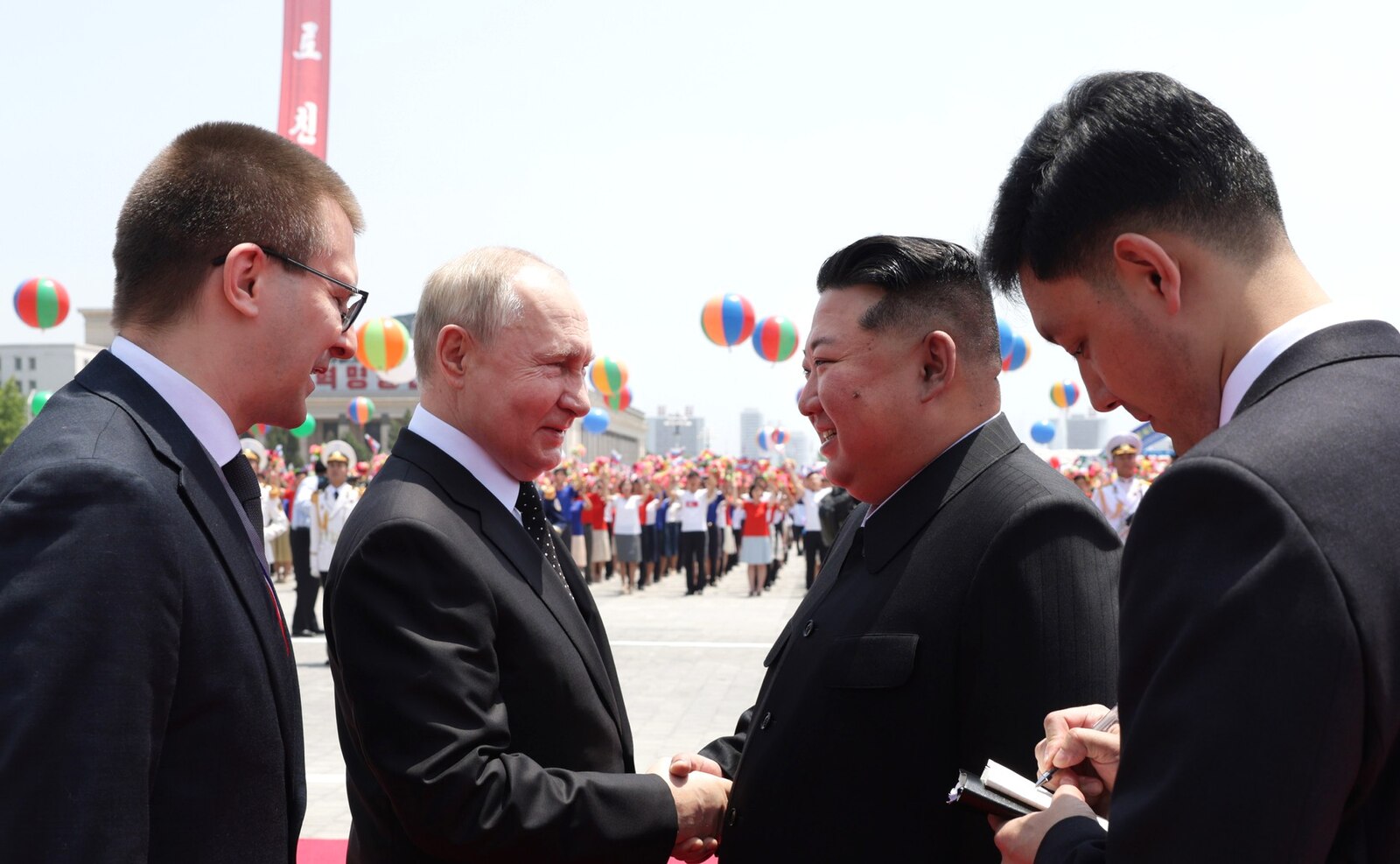 Russian President Vladimir Putin and North Korean leader Kim Jong-Un in Pyongyang on June 19th, 2024. Source: Wikimedia Commons
Russian President Vladimir Putin and North Korean leader Kim Jong-Un in Pyongyang on June 19th, 2024. Source: Wikimedia Commons
Impacts of North Korean Soldiers’ Involvement in Russia
According to recent Ukrainian intelligence information, North Korea could be willing to send up to 100,000 more troops to Russia to aid in the ongoing Russo-Ukrainian war. This information is alarming for several reasons. Previously, Ukrainian President Volodymyr Zelensky warned that significant participation of a third country could lead to a world war, and U.S. Defense Secretary Lloyd Austin referred to the situation as “a dangerous and destabilizing development.” German Defense Minister Boris Pistorius likewise cautioned that North Korea’s actions signaled the rapid approach of global conflict. By contrast, North Korean soldiers’ involvement in Russia benefits both countries in different ways, including by boosting Russia’s manpower and potentially creating an avenue for sharing highly sensitive nuclear technology.
The recent deployments are not the first time that North Korea has aided Russia’s war effort in Ukraine, as both nations have previously enjoyed good military relations. For example, North Korea has provided Russia with weapons, which it has used since January of this year. Likewise, Pyongyang has been shipping ammunition such as artillery shells to Russia. North Korean leader Kim Jong-Un and Russian President Vladimir Putin also signed an agreement on June 19th that included a mutual defense pledge.
North Korea’s recent decision to deploy some of its own men provides Russia with more troops to use against Ukraine. Russia is currently experiencing a manpower shortage, which has led Putin to seek out thousands of recruits from countries like Cuba, Nepal, and Syria for support. However, North Korea now supplies the largest number of foreign troops to Russia, including technicians and officers to help operate weapons. This number will significantly increase with the potential addition of 100,000 new men trained in basic infantry tactics, artillery and unmanned vehicle operations. As a result, Russia will have more forces available to deploy directly to the front or to take up duties in rear areas, helping it to counter the Ukrainian military presence in Kursk and simultaneously freeing up more Russian forces to enter Ukraine. Yet North Korean soldiers are often inexperienced, malnourished conscripts, casting doubt on their ability to conduct offensives, but otherwise creating a numerical challenge for Ukrainian forces and straining ammunition supplies. Nevertheless, the deployment reaffirms ties between Pyongyang and Moscow, building on a treaty that Kim and Putin ratified on November 11th that, like the June 19th agreement, calls for mutual aid if either nation is attacked.
North Korea also benefits from providing soldiers to Russia. By fighting alongside the Russians, North Korean soldiers will gain experience with more modern weapons and techniques, which could prove instrumental in the future, especially in a hypothetical war with South Korea. Support for Russia will also help improve the Kim regime’s reputation. As Royal United Services Institute fellow Samuel Cranny-Evans notes, “Deploying only to Russia would allow Pyongyang to claim that it is helping restore an ally’s territory.” This could bolster Kim’s image at home as a reliable leader by presenting him as heroic. Kim may also be hoping that sending some of his men to Russia will entice Moscow to share highly sensitive nuclear-capable missile technology. Therefore, as with battlefield experience, gaining new technology could help prepare North Korea for a continuation of the Korean War. Additionally, such technology will also provide the country with a new means of threatening the West.
For the West, finding a single, effective solution to the issue is complicated, especially since Ukraine’s Western allies are not directly involved in the war. Yet that does not mean that there is nothing the West can do. For example, Western allies must continue sending long-range weapons to Ukraine for the country to use against encroaching Russian and North Korean forces in Kursk. The West should also pressure China, a close ally of North Korea, to get Pyongyang to stop sending reinforcements to Russia’s front lines. While China could refuse given its support for the Russian war machine, the country fears that North Korean involvement in Russia could bring the West further into Asian security issues. Beijing could therefore decide to give into the West’s requests to prevent further instability that could impact its own military buildup.
Regardless of the impact that North Korean soldiers’ involvement in Russia has on the country’s military objectives, their presence serves as an indicator that the longer this war continues, the higher the probability is that it could evolve into a much wider conflict. The West, including America, must therefore be prepared for such an outcome, and President-elect Donald Trump must clarify his position on the matter in order to build a coordinated response aimed at a particular strategic outcome.
Image credit: Presidential Executive Office of Russia, creativecommons.org/licenses/by/4.0/






